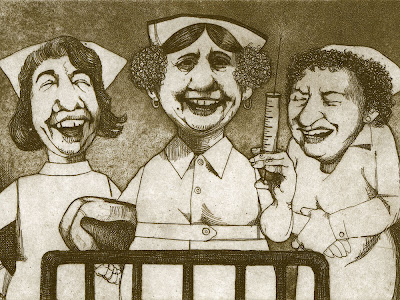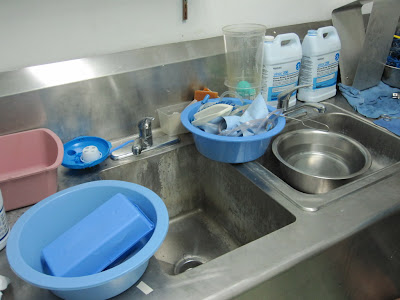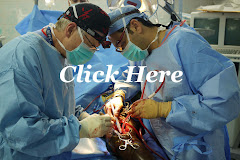The following trip report was written by Peter Elsissy, a senior Orthopaedic Surgery Resident at Loma Linda University. After graduation, Pete will be moving on to Arizona with his wife Laura for a Total Joint Fellowship. The Elsissys spent the last two weeks of March volunteering at Hopital Adventiste d'Haiti. Pictured below is Pete with one of the translators in the operating room.

Being my first mission trip, I didn’t quite know what to expect as we arrived in Haiti. What I now realize is that I got way more than I ever could have expected from this trip—a tremendous change in perspective. The emotions experienced ranged from joy, excitement and accomplishment, to sadness, fear, and a sense of helplessness. It was a very dynamic experience that is still difficult to wrap my mind around. There were many surprises along the way. The first of which happened before we even got there. For some reason, I imagined that we would be traveling from our connection city of Miami to Port au Prince in some tiny prop jet that held about 30 people. That was the complete opposite of the completely filled (all but one seat open) 767 jumbo jet that took us in to Haiti. There were a tremendous number of volunteers. One group that stands out in my mind was a team of helpers that wore shirts with the words “You Need Haiti” written in large red letters across the back. I recall lightly joking about the shirts with a few people on the plane only to later realize that the slogan was right on the money.

The country looks deceivingly “normal” from the air. It took less than five minutes to realize that “normal” means something totally different there. For starters, the “baggage claim” at the airport consisted of a large room where luggage from all arriving flights was simply thrown into a large pile for crowds of people to rummage through praying that no one had stolen their bags. Thankfully, all our bags arrived safely and were claimed appropriately. Upon exiting the baggage claim, we saw the “red fence” that LLU global rightly warned us not to cross until our ride was clearly visible. For on the other side of the fence was chaos.
Once we finally saw our ride, we built the courage to exit the airport only to be met by a barrage of people trying to “help” with our bags for tips. Help by their definition consisted of any hand that touched one or more of your bags. Not surprisingly, the short walk from the fence to our car cost the group an excess of fifty dollars.
The ride to the hospital showed a scene of complete chaos and devastation. Thousands of people in the streets surrounded by nothing but rubble, trash and make-shift shelter. It was a difficult thing to witness. Pancaked buildings, tent cities, and stray animals with people trying to find or make anything of some value. The destruction cannot be put into words and is far worse than seen on TV.
About an hour later, we arrived at Hopital Adventiste d’Haiti (HAH) in Carrefour. Interestingly, HAH is the closest standing hospital to the epicenter.
We received a warm welcome by Dr. Scott Nelson and the rest of the team. The building was surprisingly undamaged and compared to the scene on the drive was actually calm and peaceful. We were taken to our sleeping area which consisted of an open air loft with army cots and mosquito nets. The cots were surprisingly comfortable and the nets are a must as the mosquitoes are fierce. The weather—hot and humid always.
A brief tour of the facilities immediately made you realize how much pathology we were in for. There were patients EVERYWHERE. A trip to the OR brought a welcoming calm as we entered an air-conditioned arena that was the first familiar place to see. We finished a few quick I&D’s then headed up for some vegan dinner by the Supreme Masters of Ching Hai International. It was surprisingly tasty. Their ministry of cooking for the needy was greatly appreciated by patients and workers alike. We headed to bed early that first night for some needed rest.
Over the next 10 days we slowly adapted to life at the hospital. After the first few days, things got fairly routine and somewhat comfortable in a way. We woke up each day around 6 am. Breakfast (usually a Power Bar) and coffee, followed by rounds and morning report/worship at 7:30. The residents then headed to the OR (naturally) while the attendings headed to clinic. The operative experience was tremendous.
We did 64 cases in 9 days. The case load ran from infections, to fractures, and several tumors. Our team performed 3 major amputations consisting of two AKA’s and one hip disarticulation. Unlike the usual 4 week old fracture we are used to at the county hospital back home, most fractures we treated in Haiti were about 10 weeks old. We treated the usual mix of a few ankle fractures, two humerus nonunions, a few forearm fractures, a hip fracture, a tibia fracture, a femur fracture and tons of osteo/infected nonunions.
The incidence of tumors was surprising. We treated multiple soft tissue sarcomas, a few lipomas, and an osteoscarcoma. We had one case of necrotizing fasciitis that required an above knee amputation and sadly ended with the patient passing away less than 24 hours later.
One unique experience was placing Taylor spatial frames for fracture and deformity correction. In our first 2 days we placed three frames on two patients, a surgery that I have only done once in my 5 years of training in the states. These experiences surpassed my expectations and made a tremendous impact on the lives of people with serious orthopedic problems.
As for the patients--- they were wonderful. It was amazing to see how thankful people with so little could be. They were quick to smile, always grateful and rarely complained, even after major operations.

This grateful attitude only fueled a desire to work harder and do more for these patients in need. Despite working long days, it’s easy to feel that you didn’t do enough. How people with nothing could have such a great faith in God and show gratitude in such a desperate situation says a lot about their spirit. It also quickly reminded me of how many blessings we have that are taken for granted so easily. It is difficult to be home again. Our house feels bigger than ever before and our decorations and flat screen TV seem all of a sudden a bit vain. I keep asking God what I did to deserve these blessings while so many others with a faith equal or greater to mine have nothing. It’s beyond my understanding. That said, it’s comforting to know that God is just and has a perfect plan for His people. He did state that “Blessed are the meek, for they shall inherit the earth,” and “many who are first will be last and the last will be first” [Matt 5:5 and 19:30]. It seems that we have a lot to learn from the people of Haiti. The volunteers with the goofy shirts were absolutely right. I did need Haiti.

























































